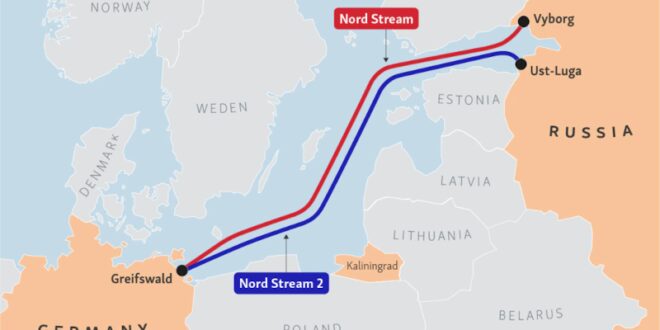On 26 September 2022, a Norwegian Navy Long Range Maritime Patrol (LRMP) aircraft, on routine surveillance mission, laid a sonar buoy field south of the Danish Island of Bornholm. This was seemingly to surveil the underwater space in the region of the Nord Stream 1 and 2 gas pipelines.
A few hours into the patrol, high-powered explosions were sensed in the vicinity of the pipelines. It was later established that three of four Nord Stream pipelines were blasted out of commission. So far investigations by Swedish, Danish, and German authorities have not pinned the blame on any country or actor. However, on 8 February 2023, Pulitzer Prize-winning journalist, Seymour Hersh, in a self-published report, claimed that the pipeline blast was a CIA operation. This article will explore the plausibility of a US proxy war on Russia—one that doesn’t directly involve NATO or itself.
The Hersh Report
According to Hersh’s report, US Navy divers were ordered to plant the explosives in a covert operation in June 2022, under cover of a NATO exercise, BALTOPS 22. Hersh suggests that the explosives were triggered by sonar buoys airdropped for the purpose, on 26 September 2022. The apparent American motive for this action was the need to reduce Russia’s commercial gains in the middle of its war with Ukraine. It was also an attempt to reduce Europe’s dependence on cheap Russian gas. For instance, the 1,200 km-long pipes that start at Russian pumping stations, transit below the Baltic Sea, and terminate in Germany, ensure gas supply to Europe. During the on-going conflict in Ukraine, it is a very profitable source of revenue for a ‘severely’ sanctioned Russia.
The pipelines thus not only fuel the war effort but also reject Western forecasts of a critical contraction of the Russian economy by as much as over 12 per cent—in reality the contraction is closer to 2 per cent. The evidence Hersh uses to substantiate his case are centred on a statement made by US President Biden on 7 February 2022 in which he said, “If Russia invades Ukraine there will no longer be a Nord Stream 2.”
This proclamation was made in the presence of German Chancellor Scholz, with the assertion that this would be the result of “joint action.” The second piece of evidence Hersh uses is a NATO maritime exercise conducted on 5-17 June 2022 in the South West Baltic Sea, codenamed ‘BALTOPS’. Fourteen NATO states along with two partners participated in the exercise. Here, Hersh relies on an undisclosed source to conjecture that the sub-surface explosives were laid under cover of this exercise, and were set off by a cooperating Long Range Maritime Patrol (LRMP). The third and last bit of evidence are the underwater explosions of 26 September 2022, which struck the Nord Stream 1 and 2 and busted three of four pipelines running south of the Danish Island of Bornholm.
Who Struck the Pipeline? And Why?
Who sabotaged the Nord Stream pipeline? And how plausible is the Hersh report? It makes little sense that Russia would punish itself by cutting off a vital source of funding to its military operations, particularly so when faced with economic contraction.
At the same time, to permanently throttle gas supply and reduce the EU’s dependence on Russia would only stiffens NATO’s resolve to back Ukraine in its war effort. After all, Russia could just as well have shut the tap rather than blow it up, if it was control that it wanted to establish. The part played by the US in terminally ending gas supply thus appears more convincing. Their intention would have been to cement and unify NATO’s resolve to support Ukraine. Further, in a September 2022 statement, US Secretary of State Anthony Blinken identified the end of Europe’s dependence on Russian energy supply as a “tremendous opportunity” to undercut Putin’s power and influence in the region.
A continuance of the conflict with NATO’s support selectively restricted to ‘just enough’ surveillance, intelligence, and supply of defensive land-based short-range arms and munitions of low conventional yield would appear to be the order of things. However, US expenditure on the conflict makes apparent that it has morphed to a proxy-war between it and Russia, with the aim to emasculate Russia.
The US Experience of Proxy Wars
Proxy wars involve the sponsorship of actors by an external state to influence a violent conflict’s outcome for that external state’s own strategic purposes. This characterisation encompasses two considerations. Firstly, the needs of the sponsoring state to avoid direct engagement while supporting the client state in order to obtain strategic political goals. Secondly, to prevent escalation beyond certain limits. It is there for all to discern why providing air power to Ukraine is a no-no while keeping the prospects of direct violence afflicting the US is kept at bay.
In any proxy war, great power competition does not visibly show itself through direct and high-intensity clashes. The US has extensive background in indirect strategies, and vast political experience with sponsoring separatists and irregular forces in campaigns. To illustrate, one need only look at US involvement early in the Vietnam War, Congo, Afghanistan, Libya, Syria, Yemen, and Iran for confirmation of its reliance on the indirect approach. The US understands full well that the key to enfeeblement of the adversary is protraction of conflict.
Conclusion
The Nord Stream episode may or may not have been engineered. It has however brought about a situation that has energised a proxy war with Russia without direct US or NATO military involvement. The larger aim of enervating Kremlin’s power and influence globally seem to be well underway. Nevertheless, the global economic fallout and its debilitating effects on the growth and privations of the European people puts a question mark on how long this proxy war can be sustained. Central to US strategic aims is Ukraine’s ability to bear with the daily crippling hardships of a devastating war, and their nation being reduced to a grisly battleground.
 Eurasia Press & News
Eurasia Press & News


